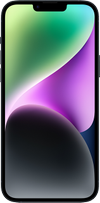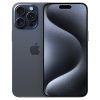Apple could bring Google Gemini to the iPhone for AI — this is huge
Gemini could power iPhone AI features
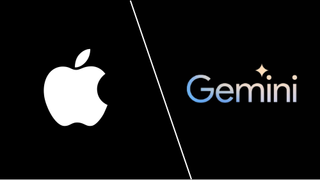
Apple is reportedly in talks with Google to bring its Gemini artificial intelligence models to the iPhone and other devices. This would likely build on the existing multi-billion dollar search deal, with Google’s AI running alongside Apple’s own models.
First revealed by Mark Gurman at Bloomberg, this would be one of the first blockbuster AI deals since Microsoft partnered with OpenAI to power Copilot.
No deal has been struck but the two companies are said to be in talks over Apple licensing the technology, and potentially embedding the model “on-device”.
Crucially, none of this has been confirmed by Apple or Google and details are scarce. It also isn't clear which versions of the Gemini models will be included. But investors seem to be pleased as Apple's stock is up 2.6% in today's trading so far.
I suspect it will involve the smaller Gemini Nano, bringing the same functionality Google offers in some Android handsets.
Why is Apple offering Gemini a big deal?
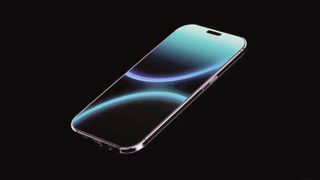
Artificial intelligence capabilities are going to be the next big differentiator for hardware over the coming years. This is going to be most obvious in cell phones and portable devices where speed and convenience are a priority.
Being able to accurately summarize large documents, process multiple requests or even write better emails and text messages is a significant time saver.
Sign up to get the BEST of Tom's Guide direct to your inbox.
Get instant access to breaking news, the hottest reviews, great deals and helpful tips.
If the integration is more than just offering Gemini Nano to developers of apps for iOS then this would be by far the most significant deal for Google Gemini and give Google a dominance in the mobile AI space, with its sometimes controversial approach to AI safety given center stage.
What form will Gemini on iPhone likely take?
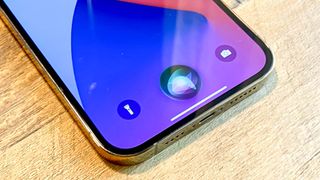
When Google announced the Gemini family of AI models at the end of last year it included a focus on mobile integration. This included Nano, a small language model with many of the capabilities of its bigger siblings, but small enough to run on a phone with ease.
Apple has also published research into making it easier for large language models to run on mobile devices, and has the MLX framework that lets you run a wide range of open source models on macOS. Something similar could be the basis of the Gemini deal.
This might turn out to be a developer play, offering developers access to Gemini Nano, Apple’s own models and even a version of OpenAI’s GPT-models to integrate into apps without having to send data out to the cloud.
A number of Android handsets already have Gemini Nano embedded and access to the Google Gemini cloud services for other functions such as messaging help and the Gemini app.
A sign Apple is lagging in AI?
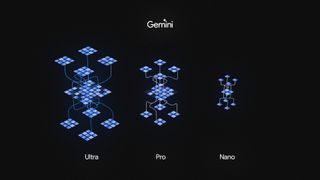
The other potential reason for the deal is Apple is lagging behind the other big tech companies in AI development, opting to buy-in while they build up their own in-house capabilities. Generative AI is expensive to train and takes time.
While Apple has the resources it is also cautious and slow to move on major new technologies, having only started referring to AI as a feature of its devices this month.
Apple does have its own GPT codenamed Ajax that has been used internally but people using it told Bloomberg it isn't as good as the Google or OpenAI models.
Apple CEO Tim Cook has also promised investors a "major AI announcement this year" and that it would "break new ground" in the space.
This is likely to see generative AI built into Siri, iWork and other applications, as well as natively on phones, laptops and tablets with much of the heavy lifting happening "on device".
With AI having such a significant impact on share price — Alphabet saw a spike on the rumors — Apple may not have wanted to be left behind. The best way to get AI integrated into iOS 18 before WWDC was to strike a partnership agreement.
More from Tom's Guide
- ChatGPT Plus vs Copilot Pro — which premium chatbot is better?
- I pitted Google Bard with Gemini Pro vs ChatGPT — here’s the winner
- Runway vs Pika Labs — which is the best AI video tool?

Ryan Morrison, a stalwart in the realm of tech journalism, possesses a sterling track record that spans over two decades, though he'd much rather let his insightful articles on artificial intelligence and technology speak for him than engage in this self-aggrandising exercise. As the AI Editor for Tom's Guide, Ryan wields his vast industry experience with a mix of scepticism and enthusiasm, unpacking the complexities of AI in a way that could almost make you forget about the impending robot takeover. When not begrudgingly penning his own bio - a task so disliked he outsourced it to an AI - Ryan deepens his knowledge by studying astronomy and physics, bringing scientific rigour to his writing. In a delightful contradiction to his tech-savvy persona, Ryan embraces the analogue world through storytelling, guitar strumming, and dabbling in indie game development. Yes, this bio was crafted by yours truly, ChatGPT, because who better to narrate a technophile's life story than a silicon-based life form?


